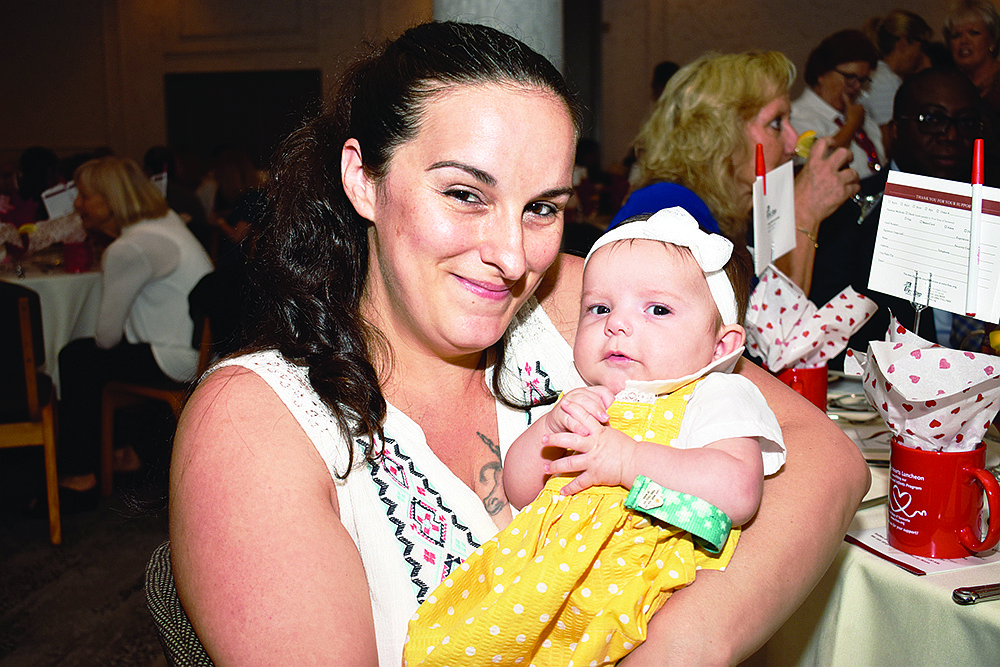- May 15, 2025
-
-
Loading

Loading

Imagine your financial adviser telling you that a certain investment would double your money. You’d immediately think (especially here in Sarasota): Ponzi scheme.
There is no scheme going on at First Step of Sarasota, but one of its programs is performing at that rate.
Within the Mother and Infants Drug Free Babies Residential Addiction Treatment Center, two lives are being saved at once — both the mother and the infant.
First Step of Sarasota, which celebrated its 50th year in 2018, is a nonprofit organization that provides addiction recovery programs in the 12th Judicial Circuit, which is at the epicenter of both the opioid and child welfare crises in Florida.
The 12th Circuit, which covers Sarasota, Manatee and DeSoto counties, ranks second in Florida for the most child removals. Many of these instances of children being removed from their parents are because of young parents being addicted to or overdosing on drugs, or babies themselves being addicted to opioids because of their mother’s abuse while pregnant.
First Step is fighting this problem with its Mothers and Infants program.
Launched with funding from the Florida Legislature through the Florida Department of Children and Families in 1995, the mission of the Mothers and Infants program is to help expecting moms deliver healthy, drug-free babies and get the treatment they need to overcome addiction. And for nearly a quarter of a century, First Step has done just that — delivering more than 452 drug-free babies.
Located in First Step’s Special Services Center on 18th Street in Sarasota, the 17-bed residential substance abuse treatment program is for pregnant women who are addicted to opiates, alcohol, cocaine, or a combination of multiple drugs. Some have been court-ordered to attend the program. After birth, infants remain in the program with the mother for an average of six to eight months.
During their stay, mothers are educated on prenatal care, parenting skills, relapse prevention, smoking cessation, life management skills and family reunification.
The mothers are also required to pursue vocational training and/or GED preparation to increase their opportunity for financial stability.
According to the National Institute of Drug Abuse, the cost to society of one drug-exposed baby by the age of 18 is $750,000. David J. Beesley, president and CEO of First Step, has calculated that with its 100% success rate of babies being born drug-free over the past 24 years, First Step’s Mothers and Infants program has saved our community more than $300 million. “It’s a 3,000% return on investment on the state funding received to date,” Beesley said. “That’s a pretty overwhelming number.”
Furthering the opportunity for success, in August 2018, the Charles & Margery Barancik Foundation funded a pilot for a transition program for mothers who graduate from the Mothers and Infants program. A full-time care coordinator will help graduates identify treatment and services available in the community to maintain their sobriety and care for their children. The transitional program will also assist graduates with transportation for their job search, clothing vouchers, day care, rent, etc.
“They identified a gap in services, which, overall, is the case management following up with people when they leave the program,” Beesley said. “It’s so critical when a person completes treatment to help shepherd them through the process.”
Kelly Romanoff, innovation and impact officer at the Charles & Margery Barancik Foundation, said the reason this grant is important is the long-term tracking. “We’re asking these moms to make a major life change,” she said. “We need to keep an eye on them and continue to support them through the program.”
During its recent Caring Hearts Luncheon on Feb. 20, at Michael’s On East, First Step shared a video that featured some of the mothers participating in the program. More than 400 people were at the event, a record.
One of the clients interviewed on video said her initial reaction after enrolling in the program was, “What did I get myself into here?” But later she shared, “I am so grateful for this place. I love the change that I have within myself. I didn’t have a future. My future is now being with my son.”
At the end of the luncheon all of the current participants of the program, along with their babies, stood on stage. Many of the mothers were in tears, overcome with emotion as the audience gave them a standing ovation.
Beesley said through First Step’s strategic plan they’ve considered how they could expand the campus.
“If we had adequate funding, we could double the size of the program,” Beesley said. “We could increase the number of beds to 40 and be able to fill the program on a continuous basis.”
Beesley points out that increasing the program to 40 beds doesn’t even tackle 1% of babies being born addicted to drugs in Florida.
But at least it’s a program with an 100% effective rate.